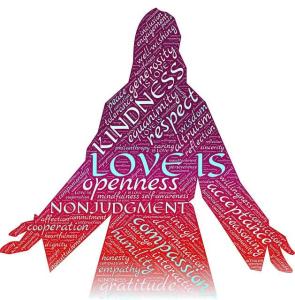
How Spirituality & Faith Affect Mental, Physical & Emotional Well-being
Call it instinct, observation or experience. Call it whatever you wish, but people realized several thousand years ago that spirituality and wellness go hand in hand. And recent studies confirm the body-mind-soul connection and suggest a prayer a day may actually keep the doctor away.
Consider these Findings…
- Researchers at Duke University Medical Center have determined that people “who practice religion had better immune function than those who didn’t. So maybe a prayer a day does keep the doctor away.”
- Harvard researchers “have found a link between religion or spirituality and a sense of purpose, estimating that individuals who frequently pray or meditate are 47% more likely to have a sense of mission and purpose in their life than those who do not.”
- Springtide Research Institute also delved into overall wellbeing. It found that people are more likely to feel they’re flourishing mentally and emotionally when religion or spirituality are important to them.
- A study in the “Journal of Health Psychology” says that strong religious practices, spirituality and frequent prayer “have been tied to lower cortisol levels.” Cortisol is the so-called “stress hormone,” and it can “wreak havoc on our bodies when it’s chronically elevated.”
- A new study that will be posted on the Skylight app this week finds that “more frequent users of their app’s spiritual exercises reported less stress, anxiety and sleep problems than less frequent users.” Read the blog here on or after Oct. 5. Skylight is a service of Radiant Foundation whose mission is to help “young people develop a meaningful relationship with God” as they face the challenges of modern life.
Spirituality’s Benefits
The obvious question is, Why do spirituality and a connection with God improve people’s overall well-being?
“Religion gives people something to believe in, provides a sense of structure and typically offers a group of people to connect with over similar beliefs,” explains the National Alliance on Mental Health (NAMI).
“These facets can have a large positive impact on mental health – research suggests that religiosity reduces suicide rates, alcoholism and drug use.”
Specifically, NAMI says that spirituality or religion…
- Creates social connections with other people
- Provides a sense of belonging
- Offers trustworthy and safe social engagement
- Provides structure, regularity and predictability
- Gives followers guidelines for living
- Teaches compassion, forgiveness and gratitude
- Identifies important life lessons
“Spiritually also incorporates healthy practices for the mind and body, which positively influences mental health and emotional wellbeing,” NAMI says.
A spiritual or religious connection:
- Empowers us
- Gives us a sense of self
- Helps us focus on personal growth
- Provides a sense of belonging
- Gives us a foundation for our lives.
The Body-Mind-Soul Connection
As a layperson, my take on spirituality and wellness is that the decline of Christianity and church attendance in America contributes to many of the problems we face in the U.S. Among the most serious are:
- Breakdown of family
- Increases in anxiety and depression
- Increases in numbers of suicides and attempted suicides
- Greater use of alcohol and drugs
- And on and on.
Many of us seem to have lost our bearings because we lack the strong and positive connections to other people and God that religion once gave us.
A new study on the body-mind-soul connection, which Skylight will post on Oct. 5, affirms “spiritual practice is tied to lower anxiety, sleep problems, stress and cortisol levels.” Cortisol is the so-called stress hormone.
This study looks specifically at the mental well-being of younger millennials (roughly ages 29-35) and Generation Z (ages 18-28) who utilize a spiritual self-care app such as Skylight’s spiritual app. It also assesses the “relationship between frequency of using the app with mental health, sleep, and spiritual well-being.”
Participants in the study were almost equally divided between younger millennials and Generation Z and were predominantly white females.
The study found that “Spiritual self-care apps like Skylight may be useful in addressing anxiety among GenZers and be a resource to spiritually connect to their personal spiritual well-being.
“Future research is needed to determine how a spiritual self-care app may benefit mental health, sleep, and spiritual well-being,” Skylight adds.
These benefits may be lifesavers, according to Skylight. “Multiple studies consistently report that attending religious services protects against suicide attempts, even after adjusting for social support.”
Faith & Battling Our Personal “Demons”
It’s ironic that one of my most recent Patheos blogs, “Can Faith Help You Fight Your Demons? Yes & I’ve Seen It,” shares a personal story about faith, mental health and emotional well-being.
It concerns my former husband whose alcoholism and mental illness destroyed our marriage and robbed our children of their father for most of their childhoods.
From all accounts, my ex- lost nearly everything – his first marriage, his children and his business – before he was willing to admit that he was not only an alcoholic, but also had serious mental health problems.
His progress toward recovery was slow, but I credit Alcoholics Anonymous with playing a significant role in his recovery because it helped him rediscover God. Read that post here.
Spirituality & Coping with Loss
One of my first articles for Patheos was a personal story about faith and its effects on overall well-being. “Why, Lord? Surviving Unimaginable Loss” recounted the accidental death of my son-in-law.
The accident occurred in our front yard. My daughter was a few steps away in the house, and their two teens were outside with him. They witnessed the devastating loss of the most important man in their lives.
I wondered at times how they would pull out of the deep depression that each one of them experienced. And the answers were God; faith, family and friends; Christian counseling and time.
When I wrote “Why, Lord,” my daughter was still visiting her husband’s grave every day. She felt close to him and closer to God at the gravesite.
“My daughter spends time with God as she sits by her husband’s grave,” I wrote. “She asks for strength and wisdom and for help in doing His will. She tells Him she needs his guidance in raising her children. On particularly rough days, she pours out her struggles to Him. And she prays for others.”
She coupled these experiences with the daily Bible studies and prayers that have been part of her life for many years. Thankfully, her connection to God has helped her cope with grief and come to terms with her loss. For that, I thank the Lord. (Read the entire post here.)
My daughter and grandchildren are still grieving, of course, but the grief has become more bearable because of their strong Christian faith. The man they love is with God, all is well with him, and in due course, they will reunite with him in the afterlife.
The Great Disconnect
“Whether we commune with the divine through prayer, meditation, movement or other ritualistic practices, the benefits to mind, body and soul are real,” Skylight says.
But many young adults in the U.S. lack a connection to our creator. Various studies have found that today’s young adults are more disconnected from church than older adults and young people in the past. And a greater percentage – one-fourth – identify as atheist, agnostic or nothing in particular.
As someone who has never doubted the existence of God, I have often wondered what anchors people who have doubts or simply don’t believe in a higher power.
Learn More
This takes us back to the fact that a person can be spiritual without being religious.
The Skylight study finds that spirituality is important to many young adults. And online resources such as Skylight’s spiritual self-help app are helping them physically (better sleep, for example), mentally (less stress) and emotionally (depression) when more traditional resources are ineffective.
Again, you may read the Skylight post after Oct. 5 by clicking here.
Another resource worth checking out is Christian author Margaret Y. Buapim’s thoughtful new post on the body-mind-soul connection, “Can Spirituality Improve Your Mental Health?” on Patheos. Read it by clicking here.
In her article, Buapim offers specific ways people can begin their journey. She encourages people to “start with prayer, meditating on the promises of His word, and focus on modest spiritual goals.
“Apps that assist with positive thoughts throughout the day may be good to keep on hand as a resource, rather than sites that are filled with arguments and controversy,” she notes.
My parting thoughts are that using an app to find God will seem foreign to older generations, but it will make sense to young adults who have no memories of life before computers and the internet.
If technology helps them develop a strong connection to God or become more spiritual beings, they will reap the benefits, as will society.













